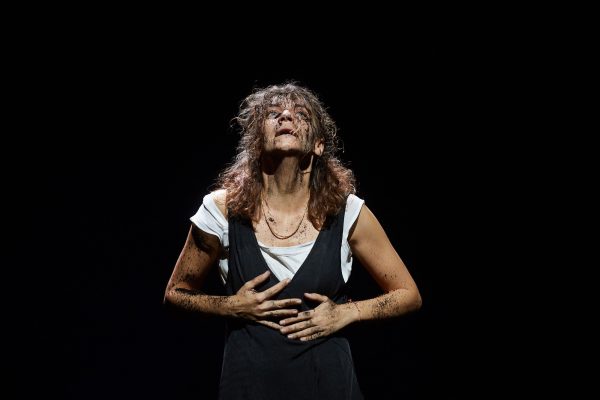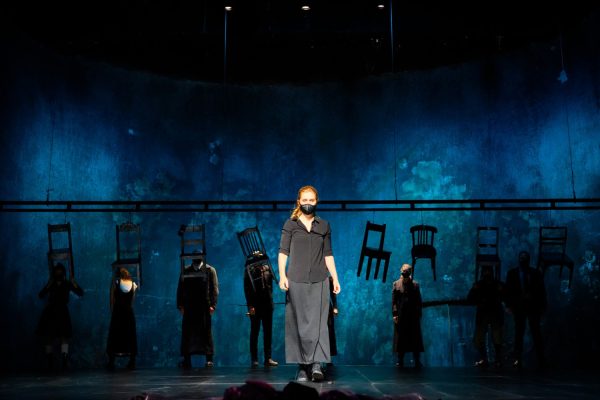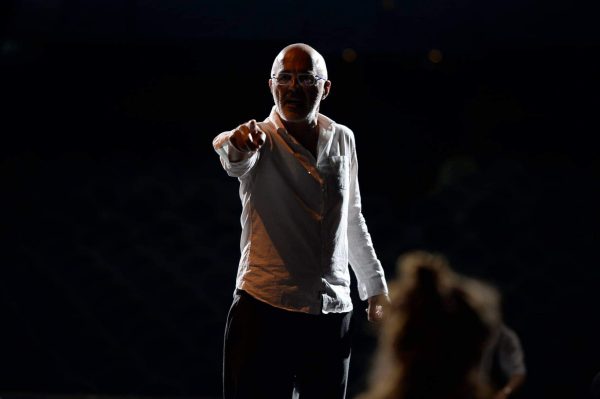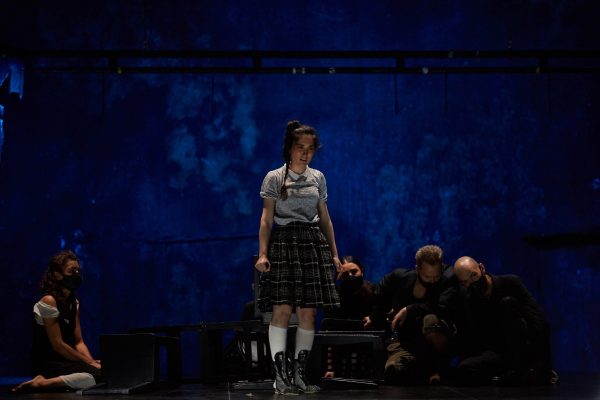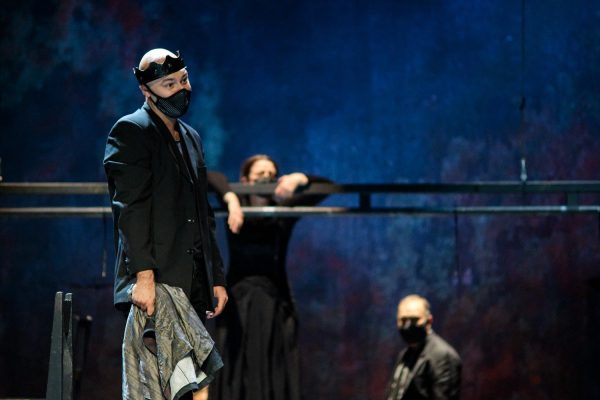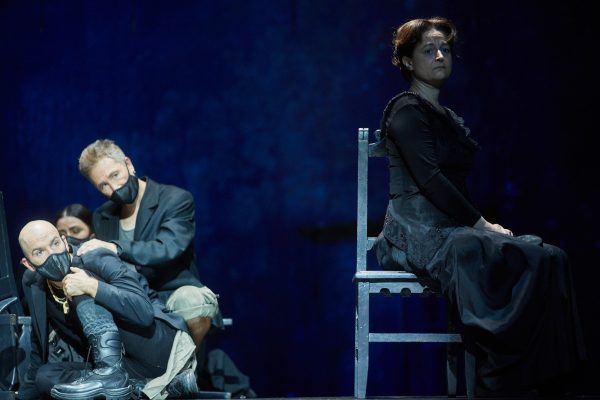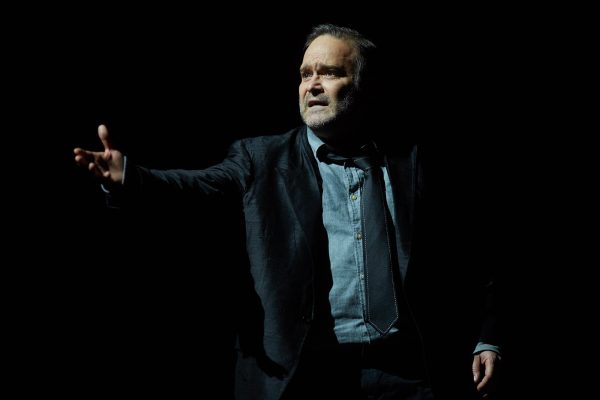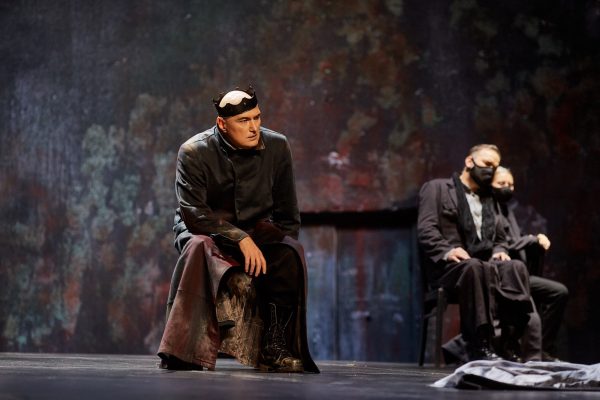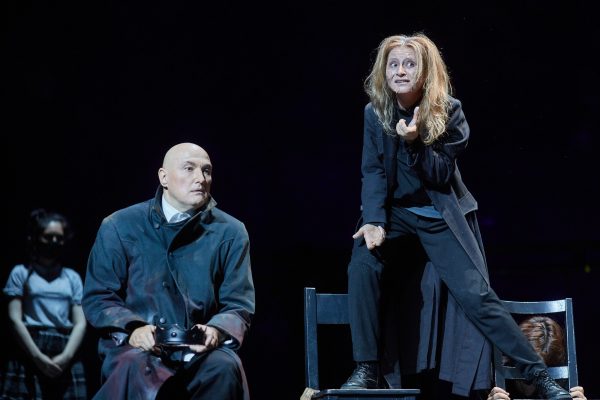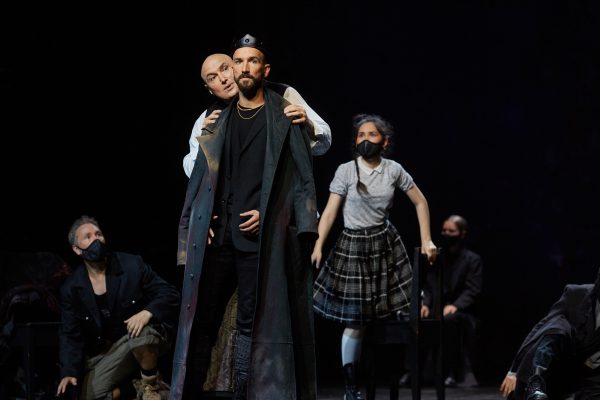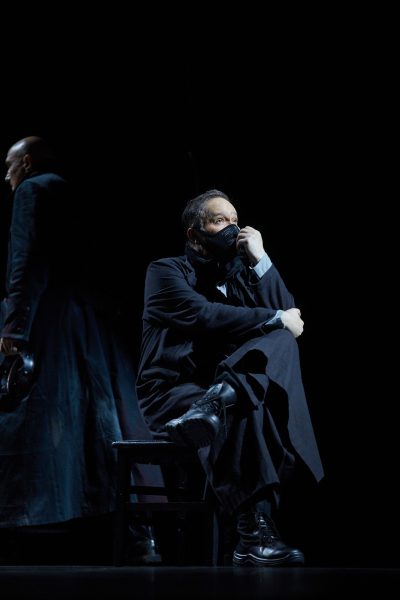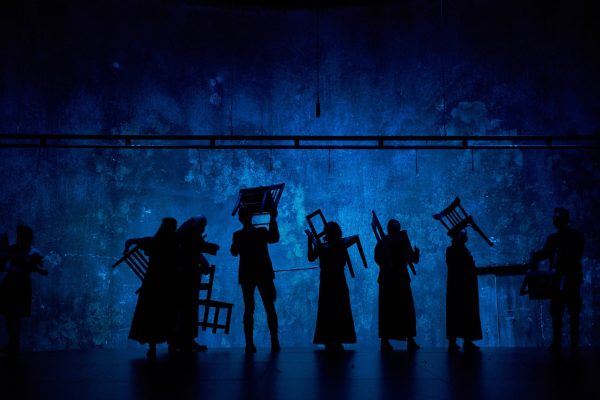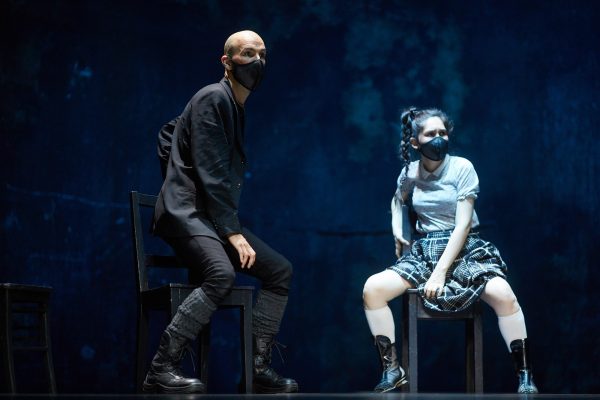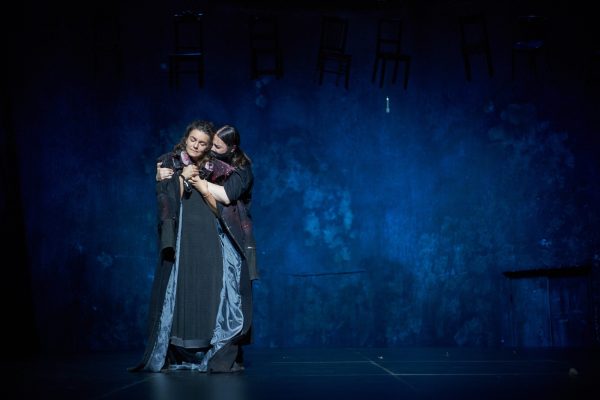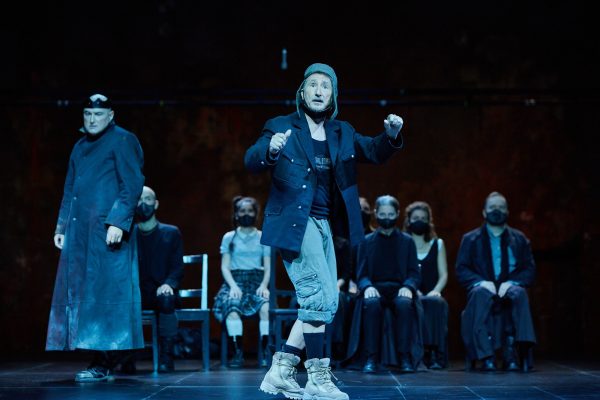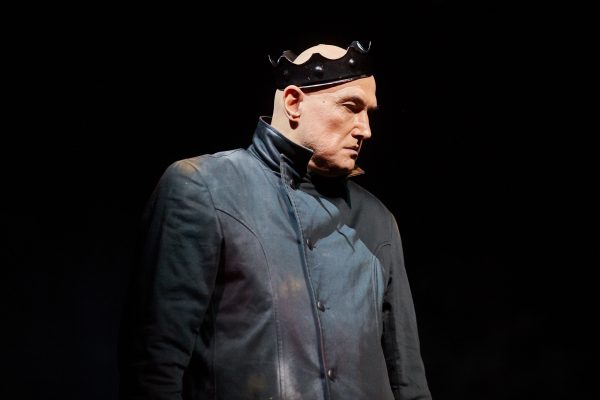Θέατρο Bulandra | Constanta State Theater
24-25 Οκτωβρίου, Βουκουρέστι.
Η «Αντιγόνη» ανέβηκε πρώτη φορά στο Μπουλάντρα στις αρχές της δεκαετίας του ’90 και είναι εύκολο να φανταστεί κανείς πόση ανάγκη είχαν την ταύτιση με την επανάσταση και τον συμβολισμό σε μια πρώην ανατολική χώρα. Η πολιτική σκέψη δεν μπορεί να απουσιάζει από αυτό το έργο, αν και εμένα δεν είναι το πολιτικό στοιχείο που με αφορά, διότι αυτά τα έργα είναι πολυεπίπεδα. Άλλωστε, δεν νομίζω ότι η επανάσταση της «Αντιγόνης» είναι αυτό που χρειάζεται να ανακαλύψει σήμερα η εποχή μας. Αντιθέτως, έχει ανάγκη να καταλάβει τι σημαίνει μοιραία σύγκρουση, όπου οι άνθρωποι πληρώνουν το τίμημα των πράξεών τους. […] Ο Σοφοκλής δεν γράφει την ιστορία ενός κακού βασιλιά αλλά περιγράφει μια τρομακτική σύγκρουση. Η αρχαία τραγωδία ως είδος είναι συγκρουσιακή και δεν αφορά ρόλους. Αυτός είναι ένας δυτικός τρόπος να βλέπουμε τα έργα μέσα από τη μοναδικότητα και μοναχικότητα των ηρώων. Δεν λέω κάτι τρομερά επαναστατικό, αλλά για μένα ο Κρέων είναι όσο τραγικό πρόσωπο είναι κι εκείνη. Στο έργο αυτό συγκρούονται δύο απόλυτες αξίες και δυνάμεις: από τη μια έχουμε έναν εμμονικό με την τάξη και την τήρησή της σε επίπεδο κράτους και νόμου και από την άλλη μια κοπέλα εμμονική με τους θεούς, την οικογένεια και τις αξίες που έρχονται από το παρελθόν. […] Η παράδοση αγαπάει τα εύληπτα πράγματα: την καλή Αντιγόνη, τον κακό Κρέοντα. Όμως η αναπαραγωγή των κλισέ είναι ο μόνος δρόμος που οφείλει ένας σκηνοθέτης να αποφύγει. Ο Κρέων, ως χαρακτήρας, εκφράζει τους νόμους και χωρίς νόμους δεν μπορεί να σταθεί μια κοινωνία. Οι νόμοι δεν υπάρχουν για να εξασφαλίζουν το καλό αλλά για να αποτρέπουν το κακό. Ο λόγος που γέρνουμε, λοιπόν, στην πλευρά του κοριτσιού είναι γιατί την αισθανόμαστε σαφέστατα πιο αδύναμη μπροστά σε έναν τεράστιο μηχανισμό, όπως αυτός της εξουσίας. Δεν πρέπει να ξεχνάμε, ωστόσο, ότι ο Σοφοκλής επιφυλάσσει στους ήρωές του στιγμές εκκωφαντικής μοναξιάς, διότι, όταν εξανθρωπίζεται κάποιος, βρίσκεται μόνος του μέσα στο σύμπαν.[…]
Στις φωτογραφίες βλέπω ότι ηθοποιοί φορούν μάσκες. Ξεκάθαρη αναφορά σε ό,τι βιώνουμε;
Είναι η δική μου εποποιία του κορωνοθεάτρου. Ξεκίνησα στη Ρουμανία πρόβες τον Μάρτιο και όταν άρχισε το μεγάλο κύμα του κορωνοϊού τα μάζεψα κι έφυγα. Αρχές Ιουλίου, που μπόρεσα και επέστρεψα, συνειδητοποίησα ότι εκεί έχουν περί τα 1.500 κρούσματα την ημέρα. Η κοινωνία και η αγορά ήταν ανοιχτές, αλλά στην πρόβα ήταν όλοι υποχρεωμένοι πια να φορούν μάσκα. Πώς θα μπορούσα να κάνω μια παράσταση σαν να είμαστε σε μια άλλη εποχή, όπου όλα είναι υπέροχα; Πώς γίνεται οι ηθοποιοί, στην έξαρση του κορωνοϊού, να παριστάνουν ότι όλα είναι καλά; Ήταν αδιανόητο σε αυτή την πρωτοφανή εμπειρία να φανταστώ ότι η αρχαία τραγωδία, που περιέχει πάντα μια συμπύκνωση της ανθρώπινης περιπέτειας, δεν θα κουβαλούσε κάτι από τη στιγμή που γεννήθηκε η παράσταση. Είναι το καθρέφτισμα της εποχής μέσα σε κάτι που έρχεται από αιώνες μακρινούς. Σκέφτηκα, λοιπόν, ότι θα είχε ενδιαφέρον να άφηνε η μάσκα το στίγμα της εποχής στην παράσταση. Άλλωστε, ως αντικείμενο είναι πολύ γνώριμο στην αρχαία τραγωδία.
Από συνέντευξη του σκηνοθέτη. Πηγή: www.lifo.gr
Σκηνοθεσία: Στάθης Λιβαθινός
Μετάφραση: George Fotino | George Florin
Διασκευή: Bogdan Ghiu
Δραματουργία: Mirela Nastasache
Σκηνικά – Κοστούμια: Maria Miu | Nina Brumusila
Μουσική: Daniel Jinga
Διανομή:
Αντιγόνη: Alexandra Fasola
Ισμήνη: Anca Androne | Silvana Negrutiu
Κρέοντας: Cornel Scripcaru
Αίμονας: Alin State | Constantin Dogioiu
Τειρεσίας: Andreea Bibiri
Ευρυδίκη: Ana Ioana Macaria
Φρουρός: Adrian Ciobanu
Πρώτος αγγελιοφόρος: Lucian Ifrim
Δεύτερος αγγελιοφόρος: Maria Veronica Varlan
-
Bulandra / Antigone: A show-force about human masks and what is behind them
The show “Antigone”, signed by the Greek director Stathis Livathinos at the Bulandra Theater, is a story about injustice, immorality, power and obedience, but also about the perennial essence of the theater in changing times.
The online premiere, on the Smart Radio platform, will take place on September 15. The show will be recorded and edited after the director’s cut, and can be viewed on www.smartradio.ro in the pay per view section.
The show is the first in a series of productions that the Bulandra Theater will distribute within the Home Theater concept, a project that aims to continue and diversify the theatrical offer that the institution has made available to the public in the months when access to theaters was restricted.
The tragedy written by Sophocles around 441 BC, which amazes even today with its terrible topicality (as if humanity has not evolved much from the moral, political and social dilemmas of over 2000 years ago…), is one of the only 7 of his pieces have survived to the present day. One of the apocryphal stories told after Sophocles’ death was that he had died trying to recite a very long phrase from Antigone without stopping to breathe.
The Antigone staged at the Bulandra Theater by Stathis Livathinos is not only a show of substance and with many strong interpretations, but also probably one of our first attempts to integrate into the stage world of this absolute symbol of the current pandemic, the protective mask. The masks worn by the actors here really made sense, and created not only a sense of strange connection with the audience (also “masked”) but also perhaps a sense of the show that otherwise would not have been visible: what masks the man wears, when and takes them out, why, and what does he look like then?…
Greek director Stathis Livathinos trained at the Russian Academy of Theater Arts in Moscow and has collaborated over time with the most important theaters in Greece. He was the artistic director of the Experimental Stage of the National Theater of Greece, an institution where he later held (2015-2019) the position of artistic director. Livathinos is said to have brought important innovations to modern Greek theater, which is not at all easy in a culture that practically invented European theater. In fact, the former Harvard professor said he was interested in bringing to the forefront the universal, eternally human meanings of ancient Greek theater, from which he staged several shows (including a famous Homer’s Iliad).
Antigone is the result of a masterclass held by Livathinos with actors from the Bulandra Theater; of which those selected for the staging of this show were Alexandra Fasolă (Antigona), Anca Androne / Silvana Negruțiu (Ismena), Cornel Scripcaru (Creon), Andreea Bibiri (Tiresias), Alin State (Hemon), Ana Ioana Macaria (Euridice), Adrian Ciobanu (The Guard), Lucian Ifrim (Messenger 1) and Maria Veronica Vârlan (Messenger 2). 10 actors in a coagulated and dynamic directorial conception, with well-dosed crescendos and exciting expressive scores. A show that has many chances to “pass the new scene”, ie the screen, in the conditions of the filmed / online theater. During the rehearsals, the director spoke about the “multiple facets of the human being” that Sophocles outlined in this tragedy. And, indeed, the staging at the Bulandra Theater is neither unilateral nor monotonous; the characters are deeply human, so complex, sometimes with some contradictory character traits – but what man is not, in fact? Antigone is the archetypal heroine, but she also has sparkles of pride and stubbornness, Creon is undoubtedly egotistical and blinded by power, but she also impresses with moments of humanity, sensitivity or even humor. How much energy and how many expressive nuances can be born and explode on a theater stage with extremely little decoration (only a few “multipurpose” seats) and with actors who (a tempora, a mores) are forced by the reality outside the stage to include it in the stage wearing protective masks. The directorial and acting ingenuity were intertwined from this perspective as well, incorporating in the story in an organic, credible way, in some places even apparently necessary the use of the necessary protective masks due to the pandemic we are going through.
The ancient story begins already full of tragedy. Oedipus had committed suicide after learning that he had married his own mother and become his father’s murderer, and his two sons (Eteole and Polynices) had faced each other in the Theban War fighting on opposite sides, and had also died; only their sisters Antigone and Ismene had survived. Their uncle, the despotic Creon, the leader of Thebes, had decided that Eteocles (who had fought on his side) should be buried with honor, but the body of his brother, the rebel Polynices, should be left unburied, prey to animals and public contempt. Antigone defies Creon’s will and manages to bury her brother in secret. When he finds out that his will has been violated, Creon becomes an explosion of anger, hatred and blind desire for revenge that will not stop until the tragedy becomes even greater and puts him on his knees.
Cornel Scripcaru plays a role of strength and endurance in Creon. The despot passes almost imperceptibly and yet palpably from the philosophy of a generous leader, balanced and devoted to the good of the people to a tyrant deeply rooted in his madness, climbing more and more to its peak, from where he collapses with the tragic multiple outcome. its orbits of egocentrism and vanity. The delicate, intense, energetic Alexandra Fasolă creates an Antigone that is both a superhuman force and a vulnerable humanity. In it, the fragility and courage of the quintessential female heroine, who opposes a fantastic energy to Creon’s arrogant and misogynistic tyranny, are overwhelmingly intertwined. Even in the calm speech of the one who knows the gods on her side, or when she still trembles in the face of terrible and terribly unjust fate, this Antigone remains real and assumed, intense but not exacerbated, and always vibrant. Hemon (Alin State), the son of Creon and Antigone’s fiancé, begins somewhat awkwardly, submissively to his ruling father, but the things he believes in, the principles that animate him, make him transform from a subject to a de facto leader, in the moral authority that opposes the legal but immoral authority of his father. There is fear, there is regret in the way his attitude of defying Creon increases, but there is also courage and commitment. Seeing this ancient character, on a modern stage inevitably influenced by off-stage reality, you can’t help but think that you would want Hemon in our public forums, in civic speeches that denounce abuses of power (whatever they may be , or she).
Andreea Bibiri does not deny her fame and creates here a Tiresias, the blind prophet, with a magnetism that gives shivers. The old man denounces Creon’s corruption and immorality and foretells misfortunes as payment for his iniquity. He is perhaps the most chameleon-like of the characters built in this show, simultaneously at the extremes: the almost decrepit fragility of old age but also the imposing force of the one who speaks the truth. It is impressive how much the contorted body can transmit on a few chairs of the actress and her rusty, hissing, overwhelming voice. All the characters are well defined and supported during the show, but among the secondary ones is the remarkable guard (Adrian Ciobanu). He moves agilely along the thin line between drama, tragicomedy and comedy, and has many moments when he is simply savory, both chameleon-like and sincere, now humble and almost immediately with a twinge of defiance, and all the time with his energy up.
Maria Miu and Nina Brumușilă are the two well-known names that signify the scenography, which is simple, atmospheric and percussive: on a background in the shades of a tragic sunset, a few chairs and then an earthen pit create the relief of human turmoil with magnitude. The seats are a throne for the king and a scaffold for the victims, a public forum from which the choir or magical place is expressed from which the trembling Tiresias foretells cruelly. As we know, Creon does not bow his head until he loses his son (who commits suicide next to the body of his girlfriend Antigone) but also his wife. Ingeniousness often lies in the greatest simplicity, and the Creon overthrown by the consequences of his own moral decay is eloquently placed in an earthen pit which is the image of a definitive physical, moral and human kneeling.
It is impressive on the one hand that the pandemic infiltrated the director’s decisions and on stage, but the way the Greek director drew the lines of force in this show seems to emphasize the astonishing topicality of many of the story’s problems: what happens when the laws are immoral and become from the protection of people a threat to them, what are the consequences of the seizure of power by those who should use it for the common good, which is the strength of the individual who rebels against an unjust order, and especially how the lights intertwine and the shadows of every man.
13.08.2020, Enescu Aky Cristina «Bulandra / Antigone: A show-force about human masks and what is behind them», www.ziarulmetropolis.ro
Για το link πατήστε εδώ
-
Antigone by Sophocles, one of the great texts of universal drama, on the stage of the Bulandra Theater!
At the Bulandra Theater, the rehearsals for the show Antigone by Sophocles began, whose premiere is scheduled for April 15.
“People think that Antigone is a heroine and Creon a tyrant. I don’t think that was the intention of Sophocles, because he, like Shakespeare or Homer, knew the many facets of the human being. I think that classic plays like Antigone are like a secret. sacred, they are the gold that must be discovered “states the director Stathis Livathinos, “probably one of the most interesting directors in the current European theatrical spectrum”, artistic director of the National Theater of Greece in 2015-2019. Livathinos, whose famous show “Iliad” after Homer went around the world, mounts for the first time in Romania but has signed award-winning successes in many countries. He has also taught theater at various universities in Greece, Russia, as well as at Harvard in the USA. The cast includes exclusively actors from the Bulandra theater, selected by the director after a four-day masterclass: Andreea Bibiri, Alexandra Fasolă, Anca Androne, Silvana Negruțiu, Cornel Scripcaru, Constantin Dogioiu, Alin State, Radu Amzulescu, Ana Ioana Macaria, Adrian Ciobanu, Lucian Ifrim, Maria Veronica Vârlan.
02.03.2020, Stan Philip «Antigone by Sophocles, one of the great texts of universal drama, on the stage of the Bulandra Theater!», www.romaniatv.net
Για το link πατήστε εδώ
-
The classic “Antigone” in the time of protective masks
Greek director Stathis Livathinos directs “Antigone” at the “Lucia Sturdza Bulandra” Theater. The staging of Sophocles’ play reformulates the relationship between the heroine and the ruler of Thebes.
“People think that Antigone is a heroine and Creon a tyrant. I don’t think that was the intention of Sophocles, because he, like Shakespeare or Homer, knew the many facets of the human being. I think that classic plays ”Antigone” they are like a sacred secret, they are the gold that must be discovered “, the director explained in the spring, when he was preparing the show.
The play that concludes the Theban trilogy starts from a point where there are already many dead. Oedipus was torn to pieces by the news that he had killed his father and married his own mother, Jocasta. His sons killed each other on the battlefield. Jocasta’s brother, Creon, came to power and forbade the burial of the one who attacked his own fortress. Antigone, the daughter of Oedipus, is determined to risk being punished with death to honor the memory of her brother whose body was left prey to wild animals on the battlefield.
The crisis of authority, the chance of injustice
Like any classic text, “Antigone” arrives on stage followed by a whole series of established forms over time. The new montage resumes the classic themes (reconfiguration of the female character, civil disobedience, the opposition between the laws of men and those of the gods, the need to respect even those who err) but adds an immediate dimension. A completely different story tells us the new song today in a version in which the crisis of authority and protective masks are part of the landmarks that we are constantly negotiating to comply with the law.All of Sophocles’ characters obey the law. And it is precisely these laws that turn their lives upside down. And the laws of the city, and the laws of respect for the dead. And Creon, who knows that “to worship the dead is in vain”, and Antigone, convinced that “the dead / For a long time we will be loved as the living”, bring before the spectator the same desire to respect what language plastic would call the defining landmarks.
The news bulletins of the day also talk about the dead and the infected, and the observance of the law as well as the observance of the person’s rights also clash in the confrontations between those convinced that they have the absolute truth in the last months.
The force of interpretations
“How good I was, how submissive! / And today everyone sees in me a rebel” says “Antigone”, which Livathinos brings both on the stage from Bulandra and in live and recorded broadcasts online. She is overwhelmingly played by Alexandra Fasola in a constantly negotiated balance with the version that Anca Androne brings to Ismena (the role of Ismena will also be played by Silvana Negrutiu). Cornel Scripcaru is Creon, with a difficult score. He has to cover a beach that takes him from the balance of the legislator who looks “with disgust at that leader who put his friends / Above the country in which he was born”, to the final collapse in the face of the destructive consequences that they have their decisions by emphasizing traditional beliefs: “As long as I live, a woman will not lead here!” and “If only the throne were taken from us / At least made by a man, not a woman!”.
The strength of the characters played by the actresses in the new production from Bulandra is decided by the sharp drive that Andreea Bibiri offers to the legendary Tiresias, the character responsible both for triggering the ode dedicated to man in Sophocles’ text and for formulating the warning about the final tragedy. The tension is also managed kinetically by Alin State (Hemon), Ana Ioana Macaria (Euridice), Adrian Ciobanu (Messenger 1) and Maria Veronica Varlan (Messenger 2).
The tragedy is coordinated at Bulandra by sequences dedicated to the rhythm of classical lyrics and musical scores conceived by Daniel Jinga only for the moments when the action reaches its paroxysm.
In the oven of consciousness
Placed in the oven of consciousness, on a stage where the scenery is limited to the new chairs that descend from the sky lined up on a metal bar, to the obsessive tunic of the fallen and to the hatch from which the earth shines from the outside (scenography by Maria Miu and Nina Brumusila) , the new version of Antigone brings to Bulandra a reopening of the relationship between authority and individual. Authority can be state, divine or literary (as is the case of the classic text of Sophocles adapted by Mirela Nastasache, after translations by George Fotino, George Florin in a stage version signed by Bogdan Ghiu). The individual is also caught in the outpouring of each monologue but especially in the discursive stories of those around him, the events in classical theater being less often shown and, as in the staging of Bulandra, rather narrated by those on stage. The way we receive the news about everything that affects our life in these times, less as an event that we experience directly and especially as a story that we relive and assume empathetically, regains its classic form with “Antigone”.
04.08.2020, Α.Σ. «The classic “Antigone” in the time of protective masks», www.orange.ro
Για το link πατήστε εδώ
